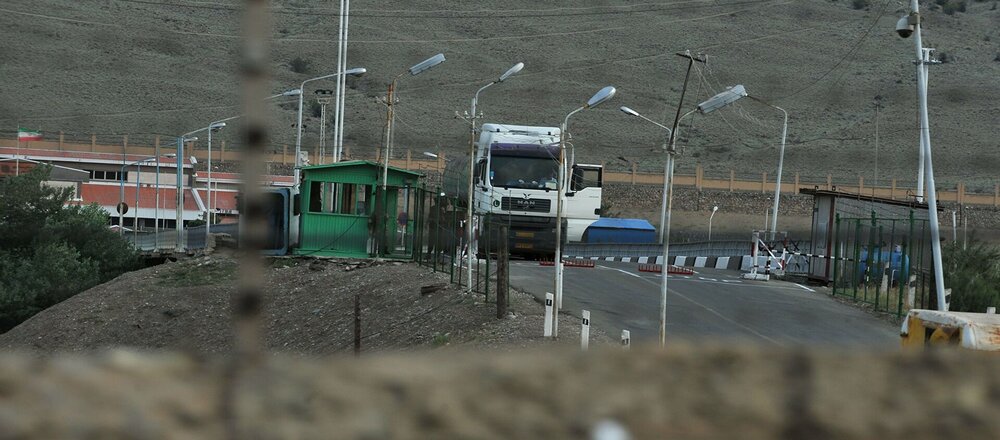Developments since the end of the 44-day war between Armenia and the Republic of Azerbaijan and the role played by some in the region, especially Turkey, Russia and the Zionist regime, show that they have long-term plans in place to secure their interests, some of which are in serious contrast with security, political and economic interests of the Islamic Republic of Iran and will create problems.
Based on the tripartite ceasefire agreement between Russia, Armenia and the Republic of Azerbaijan, the forces of Baku and Yerevan were to be stopped at the location of their last presence and refrain from further advances. However, the Republic of Azerbaijan has repeatedly made advances in the disputed areas, one of which has been the presence in the Goris-Kapan strategic transit route that created disturbances for the transit trucks and buses of Iran.
Motives of the Republic of Azerbaijan to block the transit road
The trend of the measures of the Republic of Azerbaijan on that road is aggressive and hostile. At first, the army of that country blocked the road for several hours and then reopened it during negotiations. In the next stage, the transit toll was received from Iranian vehicles by setting up checkpoints, and finally the measure led to the arrest and detention of two Iranian drivers, both of whom were Azeri, and one was traveling with his family members on that route. If the Republic of Azerbaijan intended to resolve the issue peacefully, it could set a deadline so that Armenia could take measure to widen, asphalt and complete the alternative route, and then resolve its differences with the Armenian side on this road; however, it seems that due to the procrastination and silence of the Armenian authorities in this regard and Iran’s slowness in reacting to this issue, the Azeri side has made a calculation error and thought that it could easily pursue its desires.
In order to prove its ownership of this road, the Republic of Azerbaijan relies on the documents of the internal and administrative divisions of the former Soviet Union, which rejects the criteria of the same documents of the former Soviet period to determine the legal regime of the Caspian Sea in order to gain more benefits. Baku authorities seem reluctant to rely on peaceful means in the field of international law. On the other hand, this contradictory practice of the authorities of the Republic of Azerbaijan has not received much attention from the authorities of countries such as Iran, Russia and Armenia.
In addition to disrupting Iran’s transit relations with Armenia and then Georgia and European countries, the country also insists on establishing a corridor between Nakhchivan and the Republic of Azerbaijan through Armenian territory. It is obvious that Iran opposes the creation of such a corridor that is against the interests of the Islamic Republic of Iran. Apparently, the Republic of Azerbaijan, by harassing Iranian citizens on the Goris-Kapan road, seeks to put pressure on the Islamic Republic to agree to the establishment of Zangezur corridor.
But some regional and trans-regional players also benefit from creating such a corridor and threatening Iran’s national interests, which they must accept responsibility for.
It should be noted that there are currently three routes for Iran’s land access to Europe via Armenia, the Republic of Azerbaijan and Turkey. The Republic of Azerbaijan and Turkey intend to completely exclude the use of this route from the agenda of Iran by making traffic from Armenia costly for Iran, and in this case provide suitable conditions for the construction of the Zangezur corridor. As a result, there will be two routes for Iran’s land access to Europe through Turkey and the Republic of Azerbaijan, which are currently using those transit routes to put pressure on Iran in various ways. On the one hand, the Republic of Azerbaijan stops Iranian trucks in various ways and imposes heavy customs duties, thus causing spoilage of food exports to Russia, and on the other hand, the Turkish government has repeatedly increased tariffs on Iranian drivers from this country and such developments indicate serious and long term risks for the long-term interests of Iran and Armenia.
But developments in the Caucasus do not jeopardize only the national interests of the Islamic Republic of Iran. Those developments, coupled with the Taliban gaining power in Afghanistan and increasing Pakistan’s involvement in that country as well as in the Caucasus region, could threaten the interests of China and Russia, which are in line with the US and NATO plans to weaken those emerging rivals. If the Zangezur corridor is established, there will be a safe and fast way to transfer the military forces of those countries and the Turkish-backed terrorists, as well as the Zionist, British and American affiliates to the Caucasus, and thus to the Chinese-Russian border, thus consultation with those countries and attracting their attention is necessary and important. With regard to what has been said, it should not be assumed that the construction of an alternative transit road between Iran and Armenia will solve such problems; because the issue is much more than a territorial dispute between Armenia and the Republic of Azerbaijan, and the target is to remove any obstacle to the establishment of the Zangezur corridor.
The concluding point is that it is necessary to talk to the Armenian government and complain about the unconstructive positions of some of their officials who consider Baku’s troubles for the Iranian trucks as a problem between the Republic of Azerbaijan and Iran, the importance of the issue should be justified for them and they should be reminded that it will, first of all, threaten the independence and territorial integrity of Armenia.










0 Comments